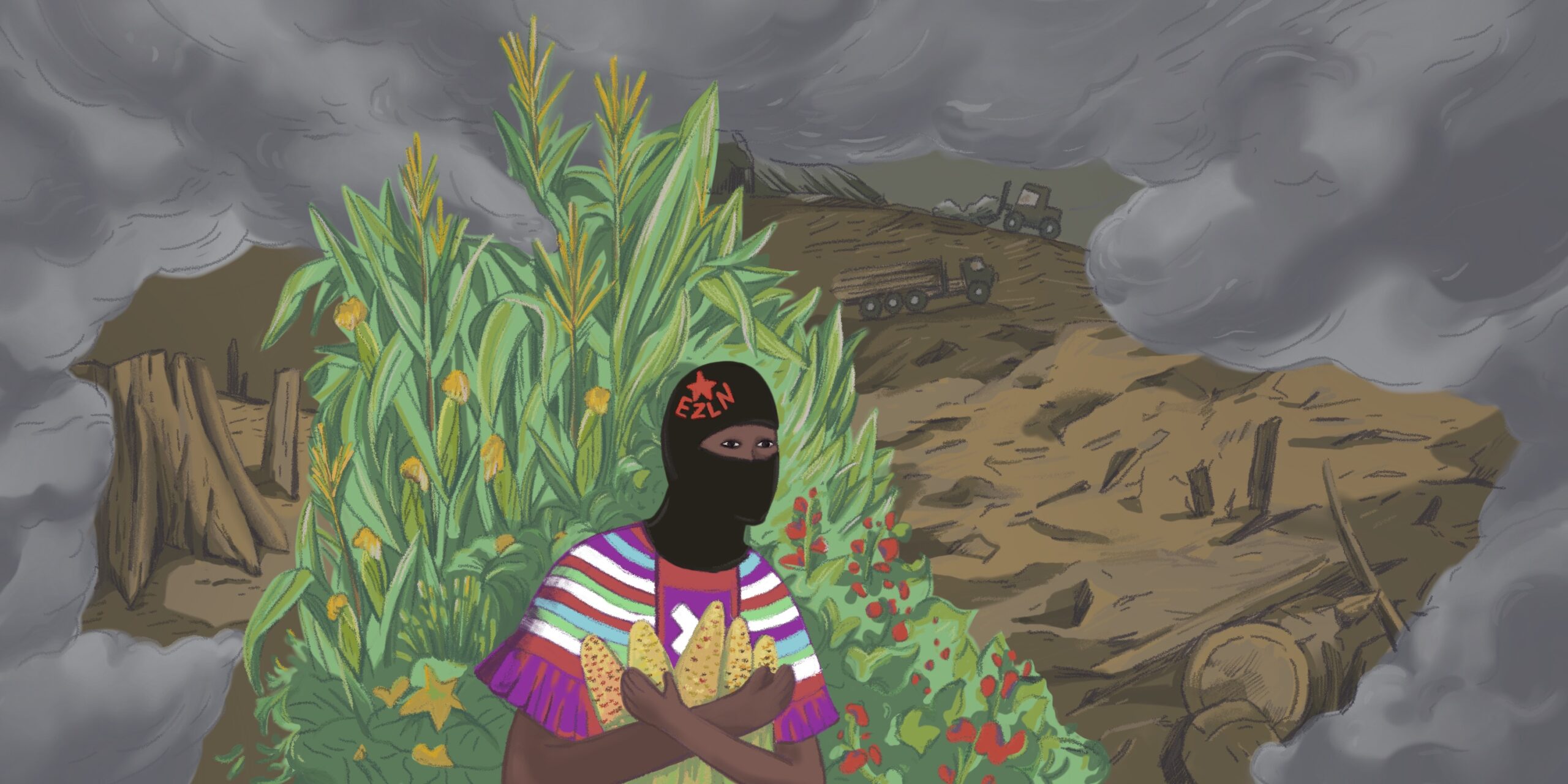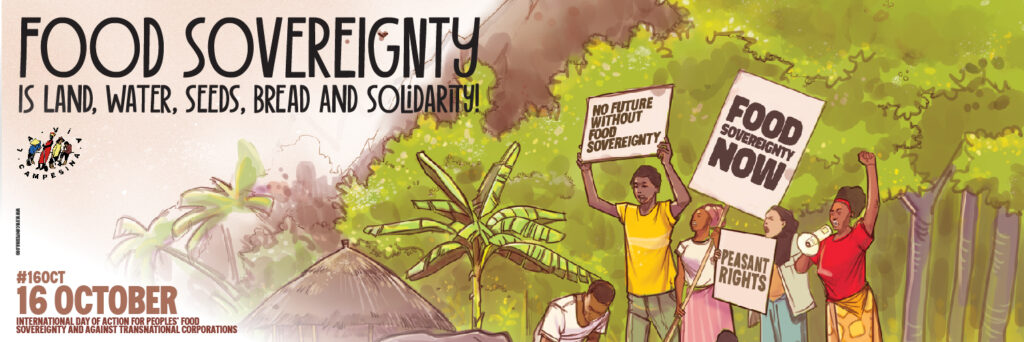23 April 2024 — Susan Rosenthal
As activists in Canada recently learned, mass protest cannot compel a government to reject war. Why is this so, and what is the alternative?
Continue reading
As activists in Canada recently learned, mass protest cannot compel a government to reject war. Why is this so, and what is the alternative?
Continue reading
Once a month, we put together a list of stories we’ve been reading: news you might’ve missed or crucial conversations going on around the web. We focus on environmental justice, radical municipalism, new politics, political theory, and resources for action and education.
 George Bahgoury (Egypt), Untitled, 2015.
George Bahgoury (Egypt), Untitled, 2015.Dear friends,
Greetings from the desk of Tricontinental: Institute for Social Research.
In November 2022, most member states of the United Nations (UN) will gather in the Egyptian resort city of Sharm El Sheikh for the annual UN Climate Change Conference. This is the 27th conference of the parties to assess the UN Framework Convention on Climate Change, commonly referred to as COP 27. The international environmental treaty was established in Rio de Janeiro in 1992, with the first conference held in Berlin in 1995; the agreements were extended in the Kyoto Protocol of 2005 and supplemented by the Paris Agreement of 2015. No more needs to be said of the climate catastrophe, which threatens mass species extinction. The move away from carbon-based fuel has been stalled by three main impediments:
Continue reading
“Are present ecological stresses so strong that if not relieved they will sufficiently degrade the ecosystem to make the earth uninhabitable by humans? Obviously no serious discussion of the environmental crisis can get very far without confronting this question.”
Barry Commoner in The Closing Circle: 1971
More than fifty years after Commoner wrote those words, the environmental problem is almost infinitely worse and what is presently called climate change once thought to affect future generations is engulfing the entire planet right now. While warnings from a scientific community not on corporate payrolls grow more desperate the global political power of capitalism, the primary cause of nature’s breakdown under stress, especially at its fading but still essential center in the USA, is making things worse not just by the hour or minute but every second.

The Police, Crime, Sentencing and Courts Act has changed the law on highway obstruction.
With campaigners regularly arrested for blocking roads, it is essential everyone knows about these changes and what they mean.
From: Volume 25, no. 1, The Soil and the Worker
 By ‘A Better Hell’
By ‘A Better Hell’Industrial agriculture has increased global food production over the past century while accruing disproportionate economic and societal benefits for industrialized nations. Across North America, these benefits have primarily been achieved by increasing production efficiencies, issuing extravagant corporate subsidies, and engaging in widespread habitat destruction that has transformed about half of the contiguous United States into cropland and pasture.1 Since the Industrial Revolution, and especially after scientific and economic developments of the early twentieth century, the cumulative effects of industrial agriculture have rapidly transitioned land ownership to a visible handful of shareholders.
I recently participated in a zoom seminar to review a new book entitled Socialist Economic Development in the 21st Century by Alberto Gabriele and Elias Jabbour. Gabriele is a Senior Researcher at Sbilanciamoci, Rome, Italy and Elias Jabbour is an Assistant Professor at the School of Economics, at Rio de Janeiro State University, Brazil.
“When a people create landlords, they create tyrants and oppressors”
Marxism, we are told, is Eurocentric and has lost much of its appeal in the eyes of many scholars and activists. Some have even denounced Marxism as a racist theory, irrelevant to the study of Africa. Vladimir Lenin is implicated in this critique. In a far-reaching study of Lenin’s ideas, Joe Pateman argues Lenin placed Africa at the centre of his analysis of imperialism and contemporary capitalism. Here, the author reflects on the key aspects of his analysis. Following this, Pateman’s full article in the ROAPE journal can be accessed for free.
By Joe Pateman
Leonardo Boff

I believe that this leap, with our participation, especially the victims of the exploitation of capitalism, can occur and would be within the possibilities of the history of the universe and the Earth: from the current destructive chaos, we can move on to generative chaos of a new way of being and inhabiting planet Earth.

“Our historic task is to ensure that no human being goes hungry”
Food Sovereignty is a philosophy of life.
It offers a vision for our collective future, and defines the principles around which we organize our daily living and co-exist with Mother Earth. It is a celebration of life and all the diversity around us. It embraces every element of our cosmos; the sky above our heads, the land beneath our feet, the air we breathe, the forests, the mountains, valleys, farms, oceans, rivers and ponds. It recognizes and protects the inter-dependency between eight million species that share this home with us.
 Walter Rodney
Walter Rodney
Walter Rodney was born in Guyana in 1942, acquired his doctorate in England at the age of 24, and then traveled widely in the Caribbean and Africa.
In 1972 he published his legendary work How Europe Underdeveloped Africa.
He was assassinated via a car-bomb in Georgetown in 1980, and the crime is widely believed to have been orchestrated by Forbes Burnham, the president of Guyana at the time.
Rodney gave this speech at Queen’s College in New York, USA in 1975. [1]
Practicing the Good: Desire and Boredom in Soviet Socialism
University of Minnesota Press, Minneapolis, MN, 2020. 336pp., $30 pb
ISBN 9781517909550
Reviewed by Isabel Jacobs
About the reviewer
Isabel Jacobs is a doctoral candidate in Comparative Literature at Queen Mary University of London. … More
In a recent article, Maria Chehonadskih (2021) argues that the adjective ‘Soviet’ is today used as a `floating signifier’ either embracing totalitarian connotations of the Soviet State or positively referring to the event and legacy of the Russian Revolution. While appreciating the first decade after the Revolution as a period of avant-garde experimentation, Western Marxists still dismiss the Soviet experience of anti-capitalism after the Stalinist period. In fact, Soviet Marxist theories and practices from the 1960-70s are terra incognita for many contemporary Marxist theorists.
30 April 2021 —
Semassa Boko and Jeanette Charles
 It is vitally necessary to bridge the gap in knowledge and dismantle US misinformation campaigns against Cuba’s realities for international English-speaking audiences.
It is vitally necessary to bridge the gap in knowledge and dismantle US misinformation campaigns against Cuba’s realities for international English-speaking audiences.
“We wanted to reach a young audience in the United States that is not typically exposed to engaging and in-depth stories about Latin America and US policy in the region.”
“Each generation must, out of relative obscurity, discover its mission, fulfill it, or betray it.” — Frantz Fanon[i]
Radicals, revolutionaries, and freedom fighters committed to imagining and building new societies must demonstrate a willingness to experiment with our strategies. Media, education, healthcare, and governance policies are important arenas where movements and masses materialize political visions. The Black Radical tradition on the continent and in the Diaspora provides strong references in this regard. Cuba is a critical example.
17 April 2021 — theplanningmotivedotcom
This article was inspired by a debate on the Academia website around a conciliatory piece by Fred Mosely. This piece and most of the comments show that Academic Marxism plays the same role as the Young Hegelians did in Marx’s day. They treat Marxism as a theoretical science not a practical science geared towards action. As capitalism lurches from crisis to crisis they are content to debate each other and render Marx more profound, and through so doing, all they reveal is their irrelevance.
26 March, 2021 — Monthly Review Press
by István Mészáros and John Bellamy Foster
On February 16, 2015, István Mészáros sent me a letter addressing the history of the Latin American Spanish edition of Beyond Capital and its reception by President Hugo Chávez in Venezuela, along with a narrative of the origins of his close friendship with Chávez. In that letter, he explained that Vadell Hermanos, the publisher of the Spanish edition, had “asked me to write a special Introduction for the Latin American edition in Spanish, and I completed this special introduction—nearly 10,000 words, not published in English—in January 2000.” The entire book incorporating this special introduction was published by Vadell Hermanos in 2001, followed by the Brazilian Portuguese translation in 2002.
8 March 2021 — theplanningmotivedotcom
This article reviews the thesis presented by the Group of International Communists, titled the “Fundamental Principles of Communist Production and Distribution”. It was written in 1930, when Stalin, donning the mantle of the Russian Revolution and having anointed himself as chief revolutionary, was crushing debate within the European left and disorientating the movement to honour his informal pact with imperialism. This is a valuable document. One of the few oppositional documents of its time, and one that needs a current airing.
10 February 2021 — Brave New Europe
People appear to understand the abstract concept of “limitless”, but it is more difficult to understand that the concept cannot and should not be applied to growth. Even socialists must shake off the idea that quantity can improve, when only quality counts.